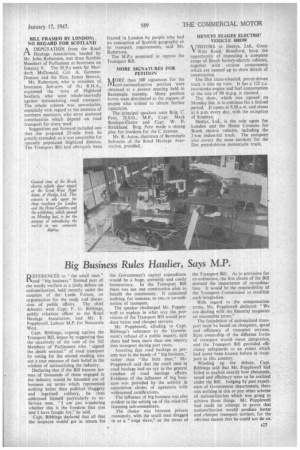Big Business Rules Haulier, Says M.P.
Page 29

If you've noticed an error in this article please click here to report it so we can fix it.
D EFERENCES to " the small man" INand " big business" formed part of the wordy warfare at a lively debate on nationalization, held recently under the auspices of the Leeds Forum, an organization for the study and discussion of public affairs. The chief debaters were Capt. F. G. Bibbings, public relations officer to the Road Haulage Association, and Mr. E. Popplewelt, Labour M.P. for Newcastle West.
Capt. Bibbings, arguing against the Transport Bill, began by suggesting that the unanimity of the vote of the 362 Members of Parliament who "signed the death warrant" of road transport by voting for the second reading, was not a true measure of their belief in the wisdom of nationalizing the industry.
Declaring that if the Bill became law tens of thousands of those engaged in the industry would be hounded out of business on terms which represented nothing better than political thuggery and legalized robbery, he then addressed himself particularly to exService men. "I am just wondering whether this is the freedom that you and I have fought for," he said.
Capt. Ribbings declared that all that the taxpayer would get in return for the Government's capital expenditure would be a huge, unwieldy and costly bureaucracy. In the Transport Bill there was not one constructive plan to benefit the community. It contained nothing, for instance, to ensae co-ordination of transport.
The speaker challenged Mr. Popplewell to explain in what way the provisions of the Transport Bill would produce better and cheaper services.
Mr. Popplewell, alluding to Capt. Bibbings's reference to the Government's refusal of a public inquiry, said there had been more than one inquiry into transport during past years.
Asserting that road haulage at present was in the hands of "big business," rather than "the little man," Mr. Popplewell said that the small men in road haulage had no say in the general conduct of road haulage affairs. Evidence of the influence of big business was provided by the activity in association circles of operators with widespread ramifications.
The influence of big business was also evident in the setting up of the road-rail licensing sub-committees.
The choice was between Private monopoly, with the small man dragged in as a "wage slave," or the terms of the Transport Bill. As to provision for co-ordination, the first clause of the Bill stressed the importance of co-ordination. It would be the responsibility of the Transport Commission to establish such' integration.
With regard to the compensation terms, Mr. Popplewell declared: "We are dealing with the financial magnates on reasonable terms."
The foundation of nationalized transport must be based on cheapness, speed and efficiency of transport services. State ownership of the different forms of transport would mean integration, and the Transport Bill provided efficiency safeguards to an extent Which had never been known before in transport in this country.
Winding up the debate, Capt. Bibbings said that Mr. Popplewell had failed to explain exactly how cheapneis, speed and efficiency were to be realized under the Bill. Judging by past experience of Government departments, there was nothing in this or any other scheme of nationalization Which was going to achieve those things. Mr. Popplewell had made no attempt to prove that nationalization would produce better and cheaper transport services, for the obvious reason that he could not do so.












































































